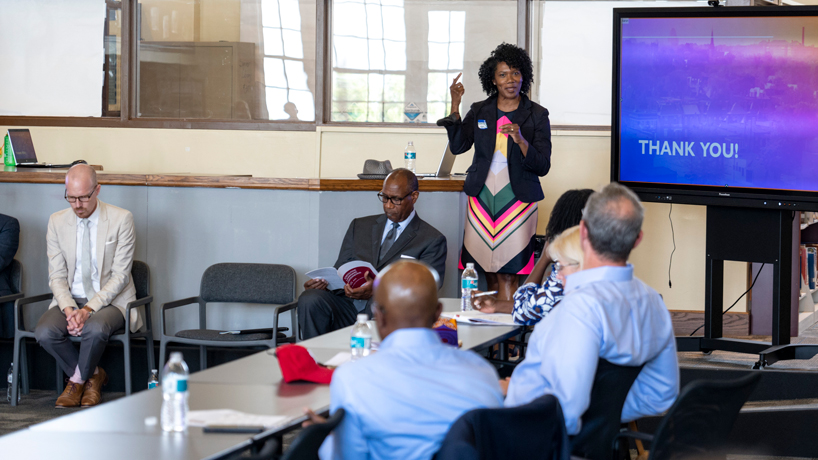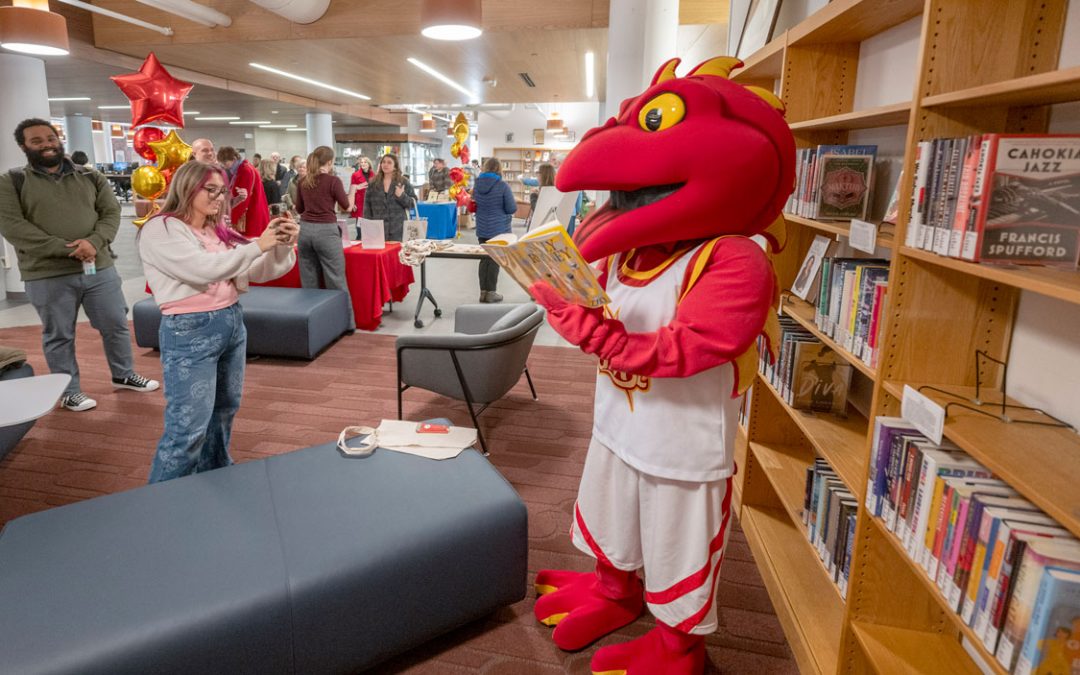
St. Louis Anchor Action Network Director Stefani Weeden-Smith speaks at an executive learning event in June at Sumner High School. (Photo by August Jennewein)
Health care systems, higher education institutions, corporations and nonprofits with deep roots in the St. Louis region have coalesced around a shared goal to enhance economic opportunity and have established the St. Louis Anchor Action Network with a focus on strengthening communities that have faced decades of disinvestment.
The network, co-led by the University of Missouri-St. Louis and Edward Jones, has specifically focused on intentional hiring and career development, purchasing and community investment in 22 ZIP codes, most in north St. Louis and north St. Louis County, that have been impacted by more than a century of systemic racial and spatial inequities.
The St. Louis Business Journal honored the network for its ongoing efforts when it named it one of four recipients of the 2023 Innovation in Philanthropy Awards. The awards, now in their fourth year, are meant to celebrate local partnerships for going above and beyond standard philanthropic practices in new and creative ways.
“I am very appreciative of this honor and really excited to work with our business partners and be able to continue to invest in a disinvested area of our community,” St. Louis Anchor Action Network Executive Director Stefani Weeden-Smith said. “We’re really seeking an aligned mindset. We are seeking coalition-building, accountability for our anchor institutions to community, and pooling our resources to be able to support community in a way that hasn’t been.”
The Network started as an initiative within UMSL and some key educational and health care partners and then expanded in the fall of 2021 with the help of a grant from the Missouri Foundation for Health, growing to currently include 14 members in addition to Edward Jones and UMSL: Ameren, BJC HealthCare/Christian Hospital, Equifax, Federal Reserve Bank of St. Louis, Great Rivers Greenway, Harris-Stowe State University, Mercy, Missouri Botanical Garden, Saint Louis University, Saint Louis Zoo, SSM Health, St. Louis Community College, Washington University in St. Louis and Webster University.
They’ve created an environment within their working groups where they can share best practices and other resources.
“We’re so pleased the Business Journal is bringing greater attention to this important work with this honor,” UMSL Chancellor Kristin Sobolik said. “We are grateful to all of our partners for their willingness to work together to purposefully help address foundational inequities in our region and to place inclusive prosperity as a core value in how we interact, work and do business.”
Laura Ellenhorn, principal and head of community impact at Edward Jones, echoed those sentiments.
“Our coalition of regional anchor institutions is honored to be recognized by the Business Journal for our collective efforts to create more equitable growth and development across our region,” she said. “Together, we’re working to improve hiring, purchasing and community investment in our organizations to enable more people and our entire region to thrive. It’s truly a privilege to collaborate on this unique effort with our members, community partners and residents and businesses across the city and county as we work to achieve our collective goals and transform the future of St. Louis.”
Ellenhorn appeared on a panel to talk about the work of the Network during the Business Journal’s Corporate Philanthropy Awards breakfast Thursday at Marriott St. Louis West.
The St. Louis Anchor Action Network works in coordination with Greater St. Louis, Inc.’s STL 2030 Jobs Plan and aligns with the Regional Business Council’s Black and Brown Executive Leadership program and STL.works.
In the past year, it has held three career expos and hiring events, helping members of the community get their foot in the door with some of the leading employers throughout the region. More than 340 registered for those events, and more than 50 job applicants have been hired through those and other initiatives, with more applicants in the pipeline.
The Network has developed a searchable community business tool that includes more than 13,000 area businesses to help Network members broaden and diversify their purchasing. At least 50 small businesses have connected with Network members about opportunities to bid for contracts.
Executives and other representatives from each member organization have also participated in community listening sessions and taken part in an executive learning experience last summer in The Ville neighborhood to get a better understanding of the community.
Weeden-Smith has also been exploring ways to spotlight local businesses for network members through video segments called Conscious Conversations.
Network members have collectively set a goal to increase purchasing and hiring by 10% in the focus footprint over the next year. And they want to model decisions that many others can follow.
“Folks don’t have to become members, but they can think about who they’re hiring and who they’re purchasing from – even from the individual standpoint,” Weeden-Smith said. “We can think about, ‘OK, this cup of coffee, where am I going to buy it? Am I going to buy it from a usual place or could I think about maybe some different places in my community?’ Especially communities that we know have been disinvested in and have been overlooked. We can make some different choices. I hope that continues to happen.”
Media Coverage
St. Louis Business Journal














